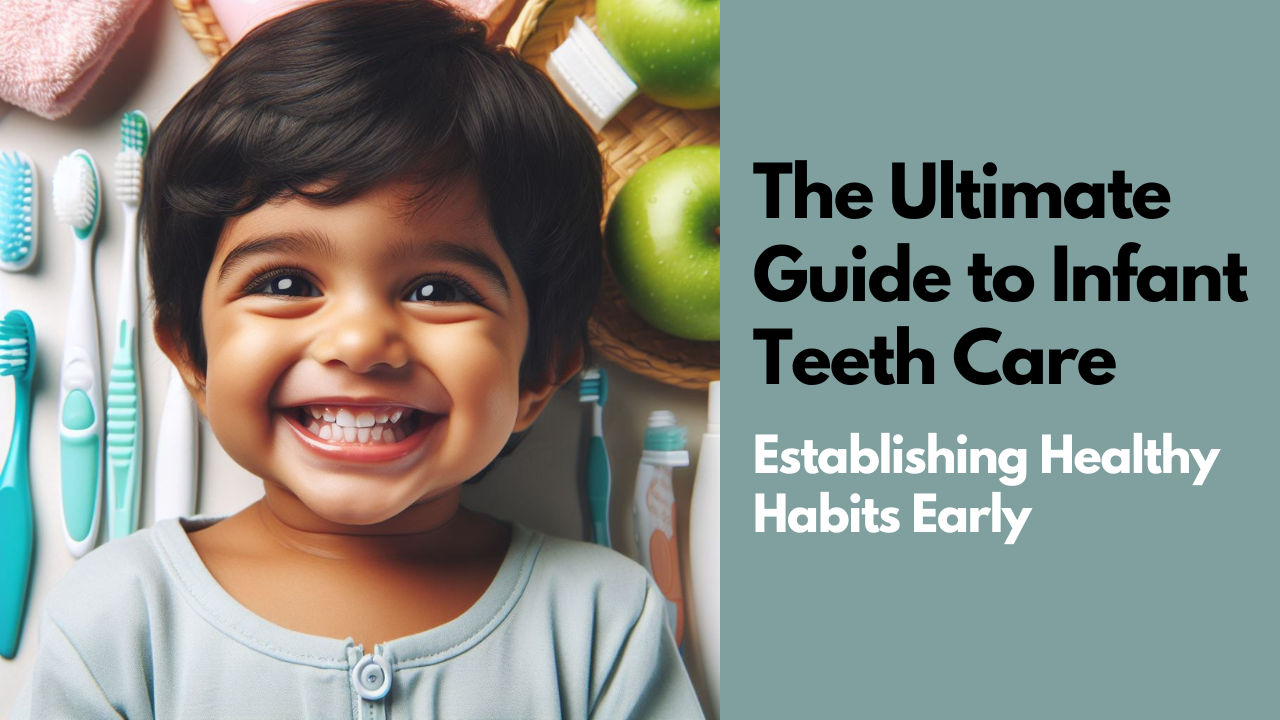
Oral hygiene is a crucial aspect of overall health, and it’s never too early to start instilling good habits in your little one. While many parents may overlook infant teeth care, neglecting proper oral hygiene practices during the early years can lead to a host of dental problems down the line. By establishing a solid teeth care routine from the get-go, you’ll be setting your child up for a lifetime of healthy smiles. This comprehensive guide will walk you through the ins and outs of infant teeth care, covering everything from dental development to proven techniques for promoting good oral hygiene habits.
Table of Contents
Understanding Infant Dental Development
Before diving into the specifics of infant teeth care, it’s essential to understand the natural progression of dental development in babies. Typically, the first tooth erupts around 6 months of age, but this timeline can vary from child to child. The primary (baby) teeth usually appear in a specific pattern, with the lower central incisors emerging first, followed by the upper central incisors, and so on. As your little one’s teeth start making their appearance, you may notice signs and symptoms of teething, such as drooling, irritability, and a tendency to chew on objects.
Establishing Infant Teeth Care Routine
1. When to Start Cleaning Gums and Teeth
2. Choosing the Right Oral Hygiene Products
When it comes to infant teeth care, selecting the appropriate products is key. Look for soft-bristled toothbrushes specifically designed for babies, as they are gentle on delicate gums and emerging teeth. Additionally, opt for fluoride-free toothpaste until your child is around 2 years old, as excessive fluoride consumption can lead to dental fluorosis (discolouration of the teeth).
3. Proper Brushing Techniques
Dos and Don'ts of Infant Teeth Care
Dos
- Wipe your baby’s gums with a clean, damp cloth after feedings to remove any residual milk or formula.
- Introduce a soft-bristled toothbrush as soon as the first tooth erupts, and brush twice daily with a rice-sized amount of fluoride-free toothpaste.
- Establish a consistent oral hygiene routine, making it a part of your baby’s daily schedule.
- Schedule regular dental check-ups with a pediatric dentist, typically around your child’s first birthday or sooner if you notice any dental issues.
- Limit sugary foods and drinks, as they can contribute to tooth decay and other dental problems.
Dont's
- Don’t let your baby sleep with a bottle containing milk, juice, or any other sugar-containing liquid, as this can lead to tooth decay (also known as “baby bottle tooth decay”).
- Don’t use toothpaste containing fluoride before the age of 2, as excessive fluoride consumption during the early years can cause dental fluorosis.
- Don’t neglect cleaning the back teeth, as these areas are just as susceptible to plaque buildup and decay.
- Don’t share utensils or cups with your baby, as this can transmit harmful bacteria from your mouth to theirs.
- Don’t use toothbrushes with hard bristles, as they can irritate your baby’s delicate gums and teeth.
Dealing with Teething Discomfort
- Chilled teething rings: Look for teething rings made of solid, non-toxic materials that can be chilled in the refrigerator (not the freezer) to provide a soothing sensation on tender gums.
- Gentle gum massages: Use a clean finger or a damp, chilled washcloth to gently massage your baby’s gums, providing relief and promoting circulation.
- Over-the-counter pain relievers: For more severe discomfort, you can consider giving your baby an age-appropriate dose of acetaminophen or ibuprofen, but always consult your pediatrician first.
Promoting Good Oral Hygiene Habits
1. Involving Your Child in the Routine
2. Setting a Positive Example
3. Making It Fun and Engaging
To keep your child engaged and excited about their teeth care routine, incorporate fun elements like colorful toothbrushes with their favourite characters or flavoured (but fluoride-free) toothpaste. You can also use sticker charts or rewards to positively reinforce good behaviour during brushing time.
4. When to Seek Professional Help
- Signs of Potential Dental Issues: If you notice any concerning signs, such as persistent discouloration, swollen gums, or unusual spots on your baby’s teeth, it’s important to schedule an appointment with a pediatric dentist right away.
- Importance of Regular Dental Check-ups: Even if you don’t notice any immediate concerns, it’s recommended to schedule your child’s first dental visit around their first birthday or shortly after their first tooth erupts. Pediatric dentists can provide valuable guidance on proper oral hygiene techniques and catch any potential problems early on.
Takeways
FAQs
1. When should I start brushing my baby's teeth?
You should start brushing your baby’s teeth as soon as the first tooth erupts, which typically happens around 6 months of age. Before the first tooth appears, you can gently wipe their gums with a clean, damp cloth after feedings to remove any residual milk or formula.
